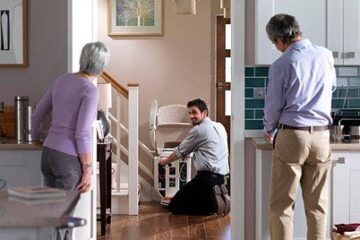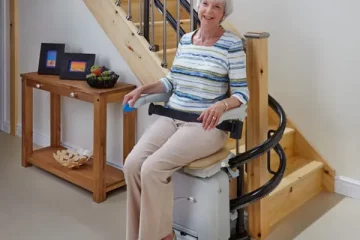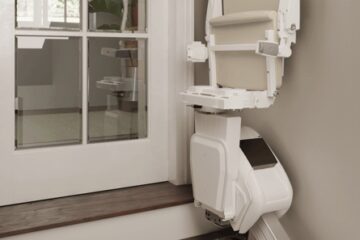Benjamin Franklin famously said, “An ounce of prevention is worth a pound of cure.” This applies to many things in life including the peace of mind, safety, and risk mitigation that a residential stair lift offers.
The cost of an elderly person falling in the home can vary significantly depending on the severity of the fall, the resulting injuries, and the individual’s overall health. Falls among elderly individuals can have a range of consequences, both immediate and long-term, that contribute to the overall cost. Here are some factors to consider when estimating the cost of a fall:
- Medical Costs: This includes expenses related to emergency medical care, hospitalization, doctor visits, diagnostic tests (e.g., X-rays, CT scans), surgery, medication, and rehabilitation. The cost can be substantial, especially for severe injuries.
- Rehabilitation and Physical Therapy: Many elderly individuals require physical therapy or rehabilitation services to recover after a fall. The duration and frequency of these services can vary, affecting the overall cost.
- Long-Term Care: If the fall results in significant injuries that require long-term care, such as nursing home or assisted living facility placement, these ongoing costs can be substantial.
- Home Modifications: Falls may prompt the need for home modifications to improve safety, such as installing handrails, ramps, or a stair lift. The cost of these modifications can vary widely.
- Assistive Devices: Depending on the injuries sustained, an elderly person may need assistive devices like wheelchairs, walkers, canes, or hospital beds. These devices have associated costs.
- Medications: Some falls lead to the need for ongoing medication, which can be expensive over time.
- Transportation and Caregiving Costs: If the individual is unable to drive or requires assistance with daily activities, transportation and caregiving costs can add up.
- Psychological and Emotional Impact: Falls can have psychological and emotional consequences, leading to anxiety, depression, and a reduced quality of life.
- Loss of Independence: Falls may result in a loss of independence, potentially necessitating a move to a care facility or the need for daily assistance.
- Secondary Health Issues: Falls can lead to secondary health issues, such as pressure ulcers, infections, or complications from immobility, which can increase healthcare costs.
It’s important to note that the cost of a fall is not limited to financial expenses. The physical and emotional toll on the individual and their family can be significant.
Preventing falls among elderly individuals through proactive measures, such as installing safety equipment (e.g., grab bars, non-slip mats), ensuring proper lighting, and promoting regular exercise to improve strength and balance, is essential. Additionally, investing in assistive devices like stair lifts or mobility aids can be a cost-effective way to reduce the risk of falls and their associated costs.
Power Stair Lifts is based in the Lehigh Valley and locally owned. We believe in price transparency. Not only do we provide our installation price and free one-year service warranty and three year parts warranty, but we will also disclose the cost of replacement batteries, preventative maintenance, annual service visit, repair fees, and a multiyear warranty. We pride ourselves not only being the local company that Lehigh Valley residents trust but also the company that earns your business with quality service and fair prices.
If you live in Allentown, Bethlehem, Easton, Macungie, Schnecksville, Whitehall, Coopersburg, Quakertown, Kutztown, Northampton, Emmaus, Catasauqua, Nazareth, or other Lehigh Valley locations, call Power Stair Lifts for a free in-home estimate. We are independently owned and operated, not a franchise, and our mission is to serve our neighbors and community. Click through our site and web pages at powerstairlifts.com or call 484-895-1188 to schedule your free home assessment and estimate.


